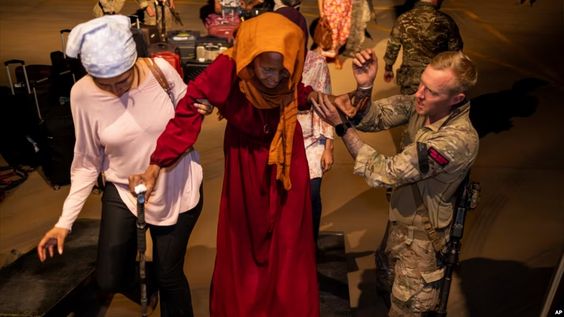Africa
Gunfire Heard in Sudan as Truce Extension Race Continues

The Sudanese army initially agreed to an African proposal calling for talks even while violence was still going on as the United States and African nations raced to negotiate an extension of the ceasefire in Sudan on Thursday.
A almost two-week long fight between the army and a rival paramilitary group called the Rapid Support Forces (RSF) has resulted in hundreds of fatalities and is threatening to destabilize the surrounding area.
The suggestion, which the army said came from the Intergovernmental Authority on Development (IGAD), an African regional organization, was not mentioned in a statement from the RSF accusing the army of targeting its forces and spreading “false rumors” on Thursday.
A resident told Reuters that gunfire was heard in the Khartoum region on Thursday.
Despite an evacuation over the last few days, the current three-day truce caused a break in combat but did not totally stop it. It was set to expire at midnight (2200 GMT).
The plan to prolong the ceasefire for a another 72 hours and to dispatch an army representative to the South Sudanese capital of Juba for negotiations, the army announced late on Wednesday, has received preliminary approval from General Abdel Fattah al-Burhan.
According to the military, the presidents of South Sudan, Kenya, and Djibouti collaborated on a plan that calls for extending the cease-fire and facilitating negotiations between the two sides.
According to the army statement, “Burhan thanked the IGAD and expressed an initial approval to that.”
An IGAD official was not immediately available for comment by Reuters.
The African Union Commission Chairperson and U.S. Secretary of State Antony Blinken talked about collaborating to put an end to the conflict, according to a statement released by the State Department on Wednesday.
Since April 15, there have been 512 confirmed deaths and about 4,200 injuries as a result of the violence.
As a result of the turmoil, more refugees are entering Sudan from outside its boundaries. According to estimates from the U.N. refugee agency, 270,000 people could enter South Sudan and Chad by themselves.
A third of the 46 million people in the country were already dependent on humanitarian aid, but the conflict’s use of air strikes and artillery has destroyed hospitals and restricted food deliveries.
A U.N. update on Wednesday stated that the war has caused treatment for an estimated 50,000 critically malnourished children to be interrupted, and those hospitals that are still operating are experiencing medical supply, power, and water shortages.
The update stated that on Tuesday and Wednesday, deadly skirmishes broke out in Geneina, West Darfur, resulting in looting, the deaths of civilians, and worries about the rise of ethnic tensions.
As part of a larger flight of expats, France announced on Thursday that it had evacuated additional persons from Sudan, including not just French citizens but also Britons, Americans, Canadians, Ethiopians, Dutch, Italians, and Swedes.
Foreigners who were evacuated from Khartoum have recounted enormous numbers of young people with large knives, burning houses, bodies lying throughout the streets, and residential areas being turned into battlefields.
The paramilitary Rapid Support Forces (RSF) and the Sudanese army had been at odds for months before the two organizations joined forces in October 2021 to overthrow a civilian administration.
An internationally supported plan to start a fresh transition towards elections and a government run by civil parties was what finally broke the impasse.
On the fourth anniversary of the popular revolt that toppled long-reigning Islamist tyrant Omar al-Bashir, a final de cree was scheduled to be signed earlier in April.
Reuters
